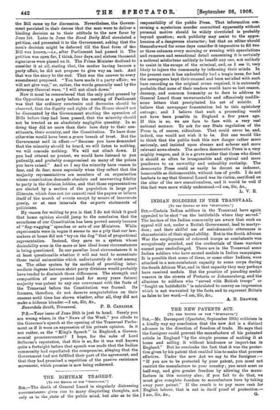THE IGHTHAM TRAGEDY.
[TO THE EDITOR Or TILE "SPECTATOR."]
Sin.,—The death of General Luard in singularly distressing circumstances gives rise to many disquieting thoughts, not only as to the state of the public mind, but also as to the
responsibility of the public Press. That information con- cerning a mysterious murder committed apparently without personal motive should be widely circulated is probably beyond question; such publicity may assist to the appre- hension of a dangerous character; but that an editor should thenceforward for some days consider it imperative to fill two or three columns every morning or evening with speculations and rumours and sensational detail concerning it is certainly a national misfortune unlikely to benefit any one, not unlikely to assist in the escape of the criminal, and, as I see it, very likely to injure the community by inflaming their minds. In the present case it has undoubtedly had a tragic issue, for had the newspapers kept their counsel and been satisfied with such bare recording as the original crime required, it is extremely probable that none of their readers would have so lost reason, decency, and common humanity as to dare to address to General Luard those unwarrantable and offensively meddle- some letters that precipitated his act of suicide. I believe that newspaper fomentation led to this epistolary outrage; and I believe that such a proceeding would not have been possible in England a few years ago. If this is so, we are face to face with a very real national menace. To ask for any State regulation of the Press is, of course, ridiculous. That could never be, and, indeed, one would not wish it to be. But one would like to think that the publio took this new danger rather• more seriously, and insisted upon cleaner and soberer and more relevant news-sheets. The modern democratic Press is a very mighty weapon, and it is a grave matter that those who direct it should so often be irresponsible and cynical and mere panderers to an unworthy and unhealthy curiosity. The democratic Press could as easily be decent as indecent, honourable as dishonourable, without loss of profit. I do not hesitate to say that General Luard was its victim, sacrificed on the altar of the new sensationalism, and it would be well if this fact were more widely understood.—I am, Sir, &o., L. V. E.










































 Previous page
Previous page